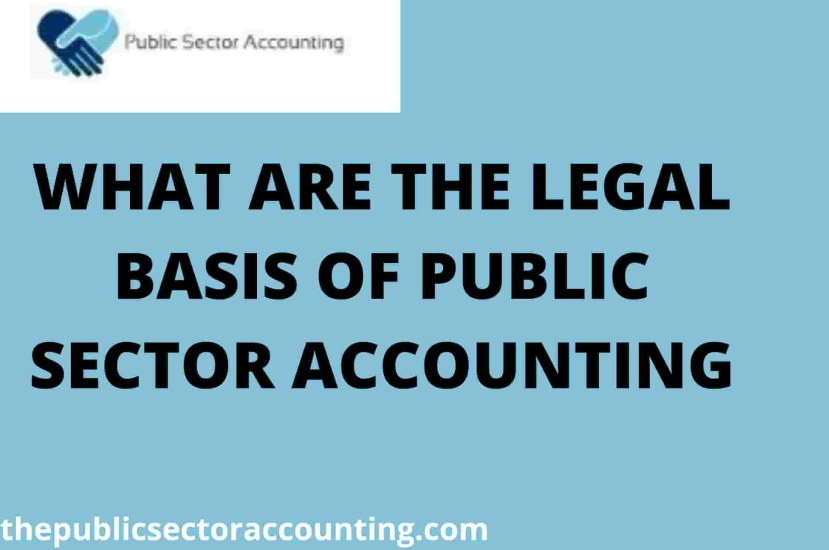Hello Dear reader! You are welcome to public sector accounting guide. Every economic system are made up of both the public and private sectors while the private sector is owned and managed by individuals and corporate entities not under the control of the state, the public sector is owned and managed by the state.
WHAT ARE THE LEGAL BASIS OF PUBLIC SECTOR ACCOUNTING
The state manages the public sector by giving responsibilities, authority and resources to qualified individuals to act on the states’ behalf.
Based on the stewardship principle, periodically, those entrusted with the management the public sector need to render accounts of their stewardship by providing relevant financial information for accountability and decision making.
Read Also: CONSTITUTIONAL, LEGAL AND REGULATORY FRAMEWORK OF PUBLIC SECTOR ACCOUNTING IN NIGERIA
The process of rendering state accounts is what public sector accounting is all about. In this unit, we first want to acquaint ourselves with the meaning and scope of public sector entities, how it is similar and differs from private sector entities, users of public sector accounting information and an overview of the relevant laws that govern the preparation of public sector accounts. We believe that you would enjoy this unit.
You may now read on…
Guide Objectives
At the end of this unit, you shall be able to:
- Identify and explain public sector entities and their importance;
- Explain the differences and similarities between public sector and private sector;
- Discuss the accounting bases and concepts for preparation of public sector accounts;
- Explain the content of the conceptual framework for preparation of public sector accounts;
Definition and Meaning of Public Sector Institutions
Generally, public sector is considered to be the section of an economic system (means by which countries and governments distribute resources and trade in goods and services) controlled by national, state or provincial, and local governments.
In other words, it refers to national governments, regional (e.g. state, provincial, territorial) government, local (e.g. city and town) governments and related entities (e.g. agencies, boards, commissions and enterprises).
These sections could be fully funded by the state to provide non-profit services to the entire economy or partially funded by the state to provide services for profits.
In Ghana, the public sector includes the central government, ministries, departments and agencies (MDAs); the local government units like the metropolitan (population of over 250,000), municipal (population of over 95,000) and district (population of 75000 and over) assemblies (MMDAs); public educational institutions and quasi government institutions like public boards and corporations.
List of ministries in Ghana, as at 2017, were finance, trade and industry, defense, interior, office of the attorney general and ministry of justice, energy and petroleum, foreign affairs, food and agriculture, education, health, monitoring and evaluation, regional reorganization and development, lands and natural resources, sanitation and water resources, railway development, employment and labor relations, transport, tourism, culture and creative arts, special
development initiatives, environment science and technology, national security, youth and sports, local government and rural development, works and housing, communication, information, roads and highways, gender children and social welfare, planning, fisheries and aquaculture, chieftaincy and religious affairs, inner cities and zongo development, business development and aviation. Departments and agencies in Ghana fall under specific ministries.
For instance, one department under the Ministry of Finance is the Controller and Accountant-General’s department whilst agencies in the same ministry include Securities and Exchange Commission and Institute of Accountancy Training and Bank of Ghana, which is an agency that the ministry has oversight responsibility. Currently, there are 216 district assemblies (metropolitan, municipal and district)
Government Business Entities
The public sector also includes government business enterprises (GBEs). Generally, GBEs are profit making entities with some minor community service obligations. These enterprises are entities that have all the following characteristics: it
- has the power to contract in its own name;
- has been assigned the financial and operational authority to carry on a business;
- sells goods and services, in the normal course of it business, to other entities at a profit or full cost recovery;
- is not reliant on continuing government funding to be going concern (other than purchase of outputs at arm’s length); and
- is controlled by a public sector entity. Examples of GBEs in Ghana include Ghana Water Company (GWC), Electricity Company of Ghana (ECG), Ghana Commercial Bank and National Investment Bank.
Even though recent developments in the global economy make it difficult for certain products and services to be solely assigned to the public sector, the sector is common in certain areas.
The public sector provides goods and services in the area of water, power, education, health, security, environmental protection, law and order, etc. Privatization of state-owned enterprises can change nature of a service from public to private.
Also, even though it is uncommon, the state sometimes takes over certain services (especially in the area of education and health) provided by the private sector. Again, the state may also decide to outsource the provision of certain services like sanitation.
Thus, the nature of the public sector is dynamic. Objectives of the Public Sector (PS) The reasons for setting up public sector organizations are varied. They include the following
- Facilitate proper administration of state business. Governance of a nation is complex. In order for the government to discharge its responsibilities well there should be an appropriate state structure that would facilitate the government’s delivery of its mandate. The public sector provides this needed support through the central government and the local government.
- Provide vital services to the state. Some important products and services cannot be left in the hands of private sector entities. This is partly because they are key to the survival of citizens and it is risky to provide such services on profit motive basis since some citizens may not afford. These include provision of water, electricity, health, education etc.
- Provide affordable services. The state sometimes intervenes in the provision of some services basically as a social intervention to provide an affordable alternative to the less endowed. The Metro Mass Transit Ltd may be considered as one. It was introduced to help cushion the citizens from high transport cost.
- Ensure the provision of security for the state. Provision of internal and external security for a country is sensitive for a private entity to handle so the state, through the police and the military takes over such functions 5. Provide employment to the citizenry. Unemployment has serious negative consequences for every nation. Key among them is reduction in economic and empowerment of the citizens which have implications for the social welfare of the state. The public sector is key source of employment for the citizens of every nation, especially developing economies. In Ghana, the public sector is the major employer for the state.
- Bridge inequalities. Driven by profit motive, the private sector may not be interested in serving communities that would not benefit them financially. These communities would then be deprived of some fundamental products and services. If the private sector were to be in charge of provision of water, electricity, etc., it is possible that some many communities would be cut off from the supply of these basic necessities of life. Eventually, the developmental gap between the rich and the poor would widen. The public sector addresses such inequalities in the state.
- maintain law and order
Continue Reading: Introduction to Public Sector Accounting in Ghana
Note:
The public sector accounting post or guides or articles are not limited to these 10 countries alone:
- Ghana
- Nigeria
- United States
- Uganda
- India
- Kenya
- Philippines
- Malaysia
- Tanzania
- South Africa
But instead targeted all the countries in the world since public sector accounting is being practice in every country in the world, so wherever country you are in the world can read public sector guides here since public sector accounting applications are similar.
Leave a comment





Leave a comment